10 Real Food Hiking Snacks to Fuel Your Next Adventure
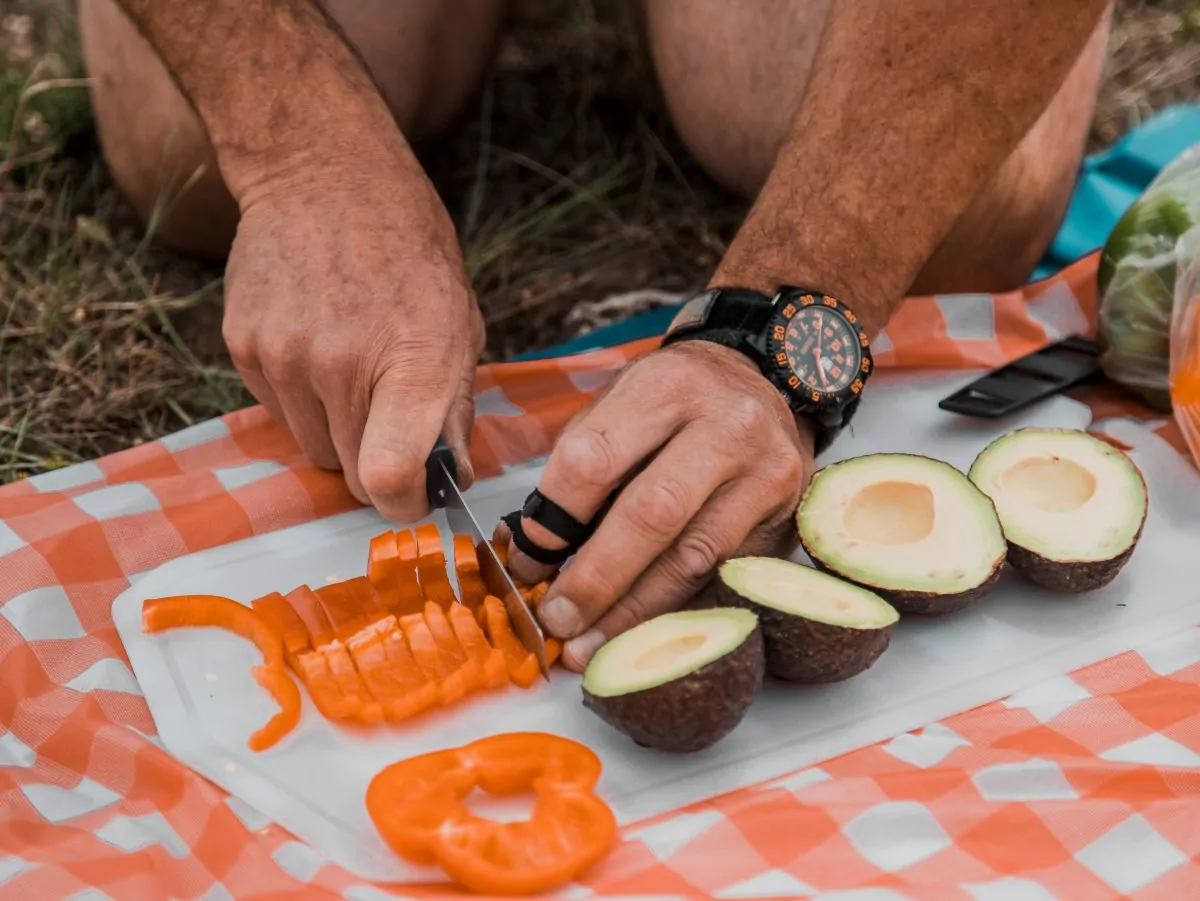
It’s time to think of hiking as an endurance sport. Which means it’s time to start eating like an athlete. These ten hiking snacks will get you going and energize you all day long.
You don’t have to be a long-distance hiker to prioritize your nutrition as an athlete. If you’re day hiking, you’ll spend multiple hours at an elevated heart rate. Your joints take impact with each strike of your foot on the trail, and your muscles burn as you high-step your way up to a summit or overlook.
So, if you’re thinking like an athlete, you’ll need to know what hiking snacks to pack. Nutritionists and backpacking companies tell you you need to eat twice the calories that you typically eat when you’re out on the trail for long days. But when you unzip your day pack to find another dense, dry energy bar, it’s easy to skip out on some much-needed nutrients. That’s why, when we hike, we bring along real, whole foods that you’ll want to eat.
While nutrition bars have come a long way in the last ten years, real, non-processed snacks are more enjoyable to eat along the trail and are more friendly on the wallet. These whole-food, energy bar alternatives will satisfy your hunger and give you plenty of fuel to power up the trail. Here are ten of the best hiking snacks you can take with you for long hikes.
1. Hummus & Veggies (and Pita!)

Hummus provides endless energy for long hiking days. I wasn’t convinced about this hiking snack until my first season guiding for Wildland: my co-guide broke out our lunch of hummus, pita, cucumber, and pepper. “I’m just not a hummus person,” I thought to myself. But I scarfed down the lunch, and by mid-day, my stride felt unbeatable. My energy levels had skyrocketed, and the pack on my back felt ten times lighter.
When you’re backpacking, hummus stays good for a few days out of the fridge (as long as you’re not hiking in desert temperatures.) It provides a perfect balance of fats, protein, and carbs—the three macronutrients you need to balance for a complete diet! It’s anti-inflammatory and high in fiber, so you can maintain good digestive health on the trail.
And while pita is a bit more processed than most of the food on this list, we couldn’t help but add it in here. Pita gives you much needed simple carbohydrates to replace your body’s energy stores. Plus, you can stow it away in your backpack a little better than traditional bread. And the fresh veggies pack a punch of essential vitamins with each bite you take.
2. Trail Mix
In terms of calories per ounce, you can’t beat trail mix.
Elena Wright, a registered dietician at Intermountain Medical Center, says that “Trail mix provides a great combination of carbohydrates, 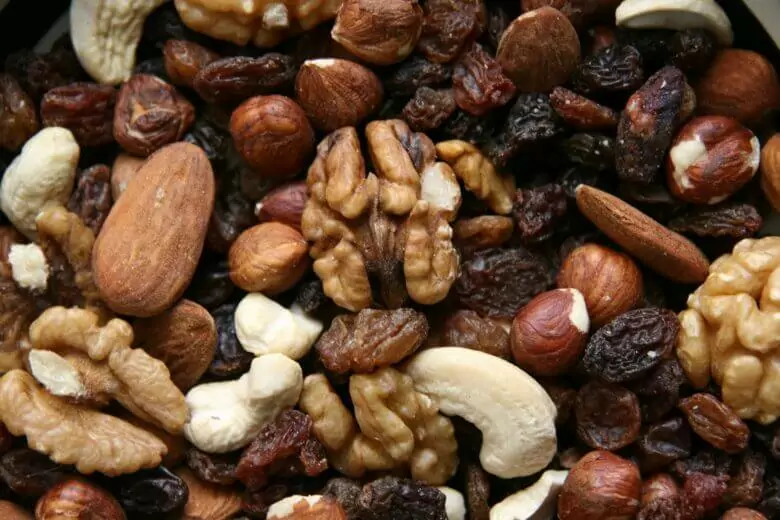 fat, and protein. It is energy-dense to fuel a day of hiking. Nuts and seeds are high in unsaturated fats that provide energy, and they also pack in plant-based protein that aids muscle recovery. Dried fruits are a good source of quick-digesting carbohydrates to replenish glycogen stores.”
fat, and protein. It is energy-dense to fuel a day of hiking. Nuts and seeds are high in unsaturated fats that provide energy, and they also pack in plant-based protein that aids muscle recovery. Dried fruits are a good source of quick-digesting carbohydrates to replenish glycogen stores.”
The best part is that trail mix is customizable. If you make your own, you can add dark chocolate, coconut, dried cherries, or anything else your heart desires. Buying nuts in bulk at your local grocery store helps cut down your cost compared to buying a pre-made trail mix.
3. Cheese
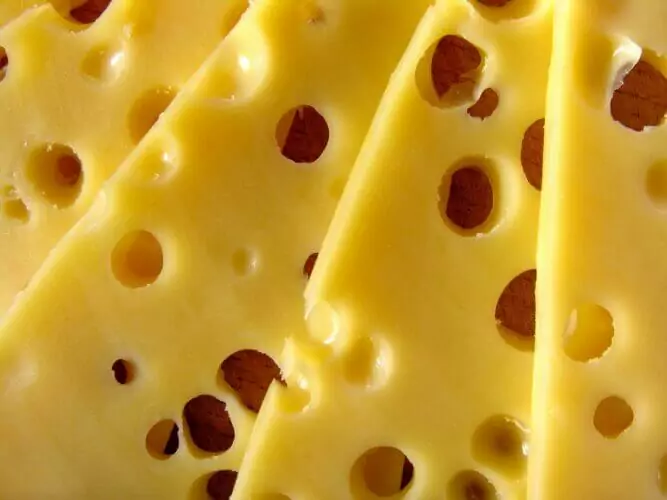
While most people shouldn’t overload on dairy when they’re on hiking and backpacking trips, you can incorporate moderate amounts of cheese into your snacking. And how can you go wrong with the abundance of portable cheese options? String cheese, Baby Bellas, and sliced cheese are all great options for a protein-rich trail snack. They contain calcium, which is beneficial for bone health, especially during a long day of heavy impact.
Cheese is high in fats and proteins, which many hikers fail to get on the trail. But these macronutrients are crucial for long hikes to fuel yourself beyond simple carbohydrates. They are calorically-dense, so it’s easy to get enough food without having to carry a ton of weight.
If you’re hiking in hot climates, choose a firm cheese, like sharp cheddar or parmesan.
4. Fresh & Dried Fruit
Fresh and dried fruit provide you with important sugars so you can keep climbing even when you’re tired. They are low on fats and proteins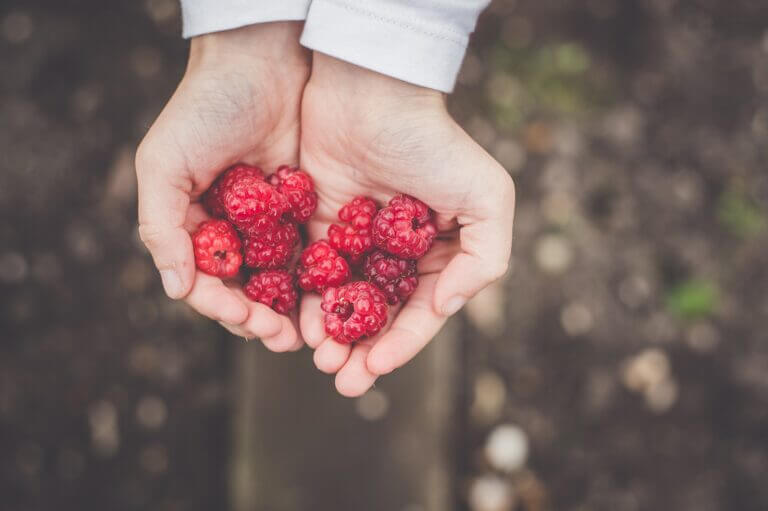 , but high in vitamins and carbohydrates (which are crucial for quick energy.) Keep some dried mango (my favorite) in the waistband of your pack for easy access. That way, when you start bonking, you can munch on these for a swift sugar surge.
, but high in vitamins and carbohydrates (which are crucial for quick energy.) Keep some dried mango (my favorite) in the waistband of your pack for easy access. That way, when you start bonking, you can munch on these for a swift sugar surge.
Many canned or dried fruits come loaded with extra sugar, so opt for a no-sugar-added version. If you have a dehydrator, drying out fresh fruit is an easy way to make a portable trail snack. Dried fruit is lighter and longer-lasting than fresh fruit. Plus, if you make banana chips, you won’t have to worry about packing out your peel.
Better yet, if you’re hiking in the mountains during the late summer and early fall, you may be able to find edible berries along the trail. Just bring a trail guide with you and make sure you can properly identify them before eating any wild plants!
5. Nut Butter
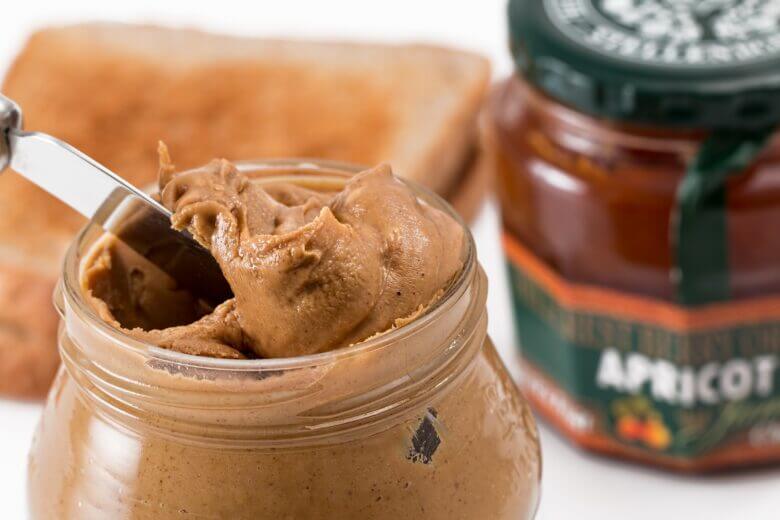 The creamy, saltiness of nut butter is extra satisfying during a long hike (just make sure to keep your water on hand.) And now, peanut butter and other nut butters are exceptionally easy to pack on a hike—thanks to the rise of squeeze packets! (Or, if you’d prefer a more eco-friendly alternative, pack a few tablespoons in a small Tupperware). Many companies now offer these products without added sugar, oil, or preservatives, so be sure to look at the ingredient list.
The creamy, saltiness of nut butter is extra satisfying during a long hike (just make sure to keep your water on hand.) And now, peanut butter and other nut butters are exceptionally easy to pack on a hike—thanks to the rise of squeeze packets! (Or, if you’d prefer a more eco-friendly alternative, pack a few tablespoons in a small Tupperware). Many companies now offer these products without added sugar, oil, or preservatives, so be sure to look at the ingredient list.
These calorie-dense snacks are mostly fats and protein, which helps you feel full for longer. By snacking on nut butters, you’ll replace your long-term energy stores so you can stay active all day.
Peanut butter has the highest protein amount of all the varieties, so if you’re low on protein-rich snacks, this is a good bet. Nut butters also contain vitamins A & E—antioxidants that can help decrease muscle damage. These vitamins, which play an important role in energy production, are especially helpful in hot environments.
6. Avocado
Avocados are another great way to get plant-based healthy fats in your diet. They are crammed with vitamins and minerals, such as vitamin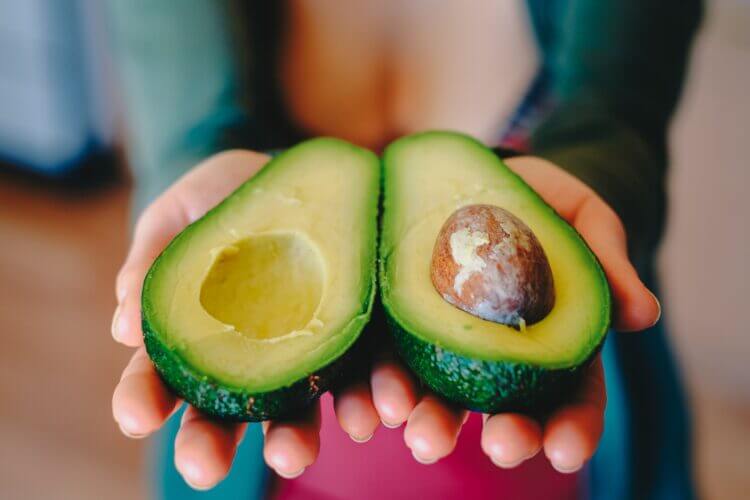 B6, C, and E. Their anti-inflammatory properties will keep your body feeling fresh on mile ten.
B6, C, and E. Their anti-inflammatory properties will keep your body feeling fresh on mile ten.
Bring a pocket knife and a small spoon to make this a trail-friendly snack! Also, make sure you bring a small trash bag to pack out the pits and peels. Although fruit remnants may seem harmless, tossing scraps can attract wildlife and interfere with the local ecosystem. If animals begin to associate humans with food, they may become aggressive. If animals like bears and bison are too habituated to humans, they are often put down or relocated because they create too much risk for hikers.
7. Popcorn
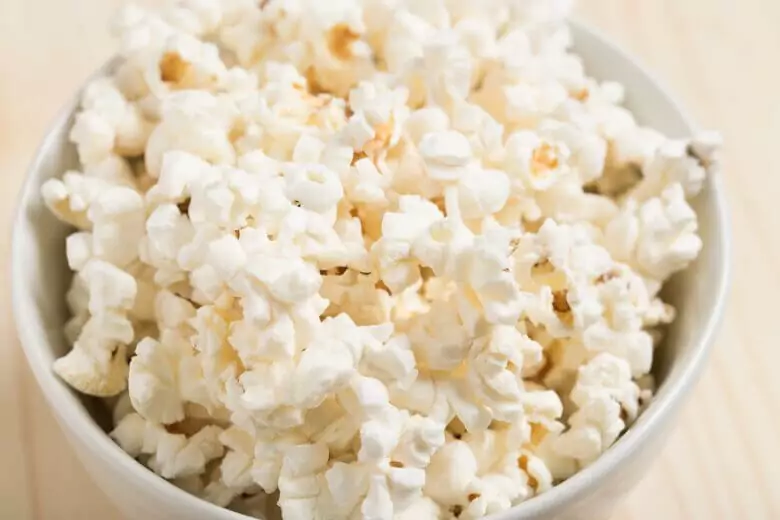
If you’re not concerned about pack volume, but you want to cut down on weight, popcorn is the answer. Light as air (but takes up a heck of a lot of room in your pack), this salty snack can be made ahead of time and loaded with goodies to increase the nutritional value and get you some quick carbs. It’s a whole grain that’s high in essential vitamins like magnesium, manganese, zinc, and phosphorus.
Make it ahead of time and load it up with butter or olive oil, nutritional yeast, and salt so you can up your calorie intake and ensure you’re getting enough sodium to replace electrolytes.
8. Hard-boiled Eggs
Gone are the days that nutritionists recommend steering clear of eggs. These babies have the full range of nine amino acids, making them a  great source of complete protein. The yolk is full of nutrients such as B vitamins, zinc, and calcium.
great source of complete protein. The yolk is full of nutrients such as B vitamins, zinc, and calcium.
Your friends may shake their heads and pinch their noses when you whip out hard-boiled eggs, but they make great, portable hiking snacks. Just be sure to carry along a little bag or container to pack out your shells!
9. Coconut Water
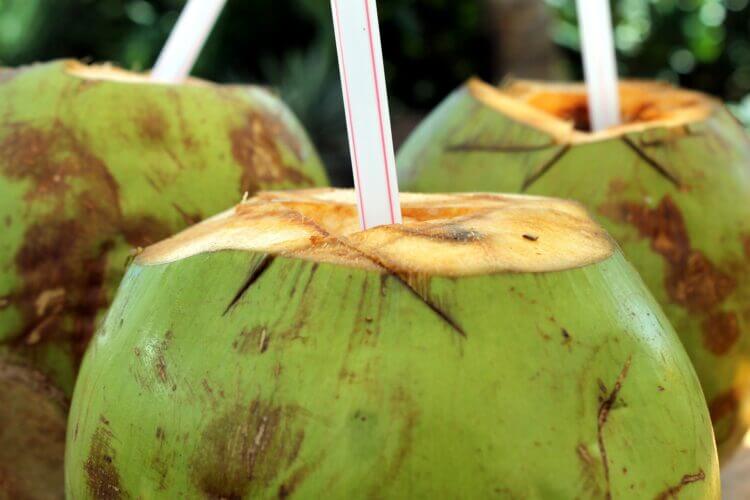
While it’s not a traditional hiking snack, coconut water supplies you with all the electrolytes offered in sugary sports drinks, without the added sugars and food coloring. This rehydrating beverage is high in potassium, which reduces muscle cramping. It also contains sodium, which hikers need to replenish as they work hard and sweat. In contrast to plain water, it contains more sugars and calories, offering you easily digestible carbohydrates as fuel.
It even comes in a portable, powdered form, just like other electrolyte mixes.
10. Tuna Pouches and Super Seed Crackers
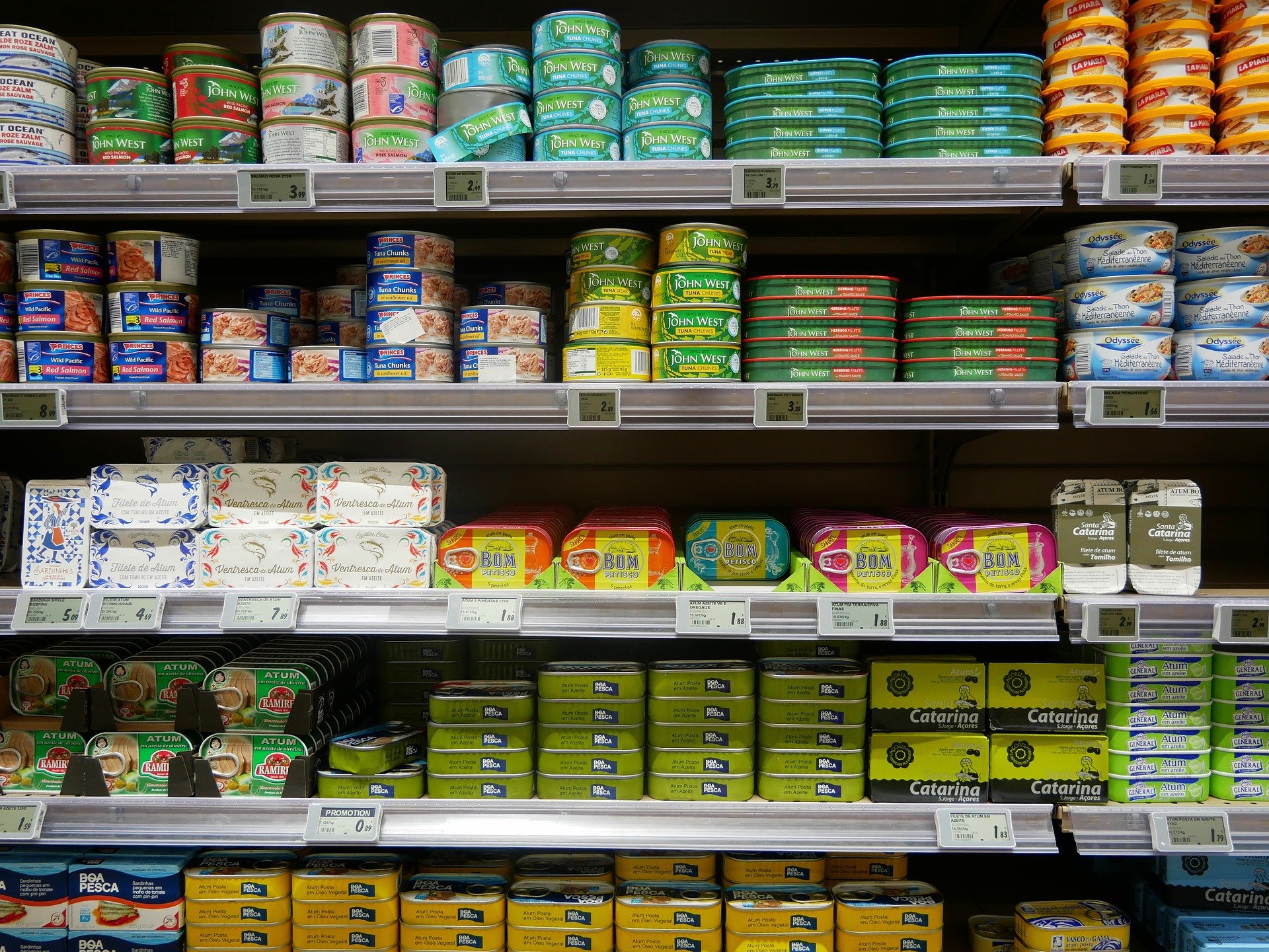
Tuna packets have gotten so portable that they make for a simple trail lunch. Eating tuna is a great way to get enough protein while you’re on a hike, and to ensure you’re not just snacking all day. It’s high in potassium and vitamin B, which regulates your body’s energy by processing your carbohydrate and protein stores. Pair tuna or salmon packets with your favorite super seed crackers (like these from Trader Joes!) for some serious fuel.
hiking snacks for your next adventure
When you buy gear for your next outdoor adventure, you’ll be bombarded with aisles of processed hiking bars and freeze-dried snacks. While some great products exist, we opt for real food alternatives whenever we can. They’re both easier on the wallet, and you’ll feel unstoppable as you reap the rewards of your nutrient-rich snacking. You should aim to consume all three macronutrients—fats, proteins, and carbohydrates—when you exercise for longer than a few hours. But most importantly, real food snacks provide essential micronutrients, like vitamins and minerals, which are crucial to restoring your body as you wear it down on the trail.
Did we miss any of your favorite hiking snacks? Let us know on social media and share this article with your friends so that next time you hit the trail, you can maximize your energy and hike all day!
Or, if the thought of food preparation stresses you out, hike with us and let our guides do all the hard work for you.





